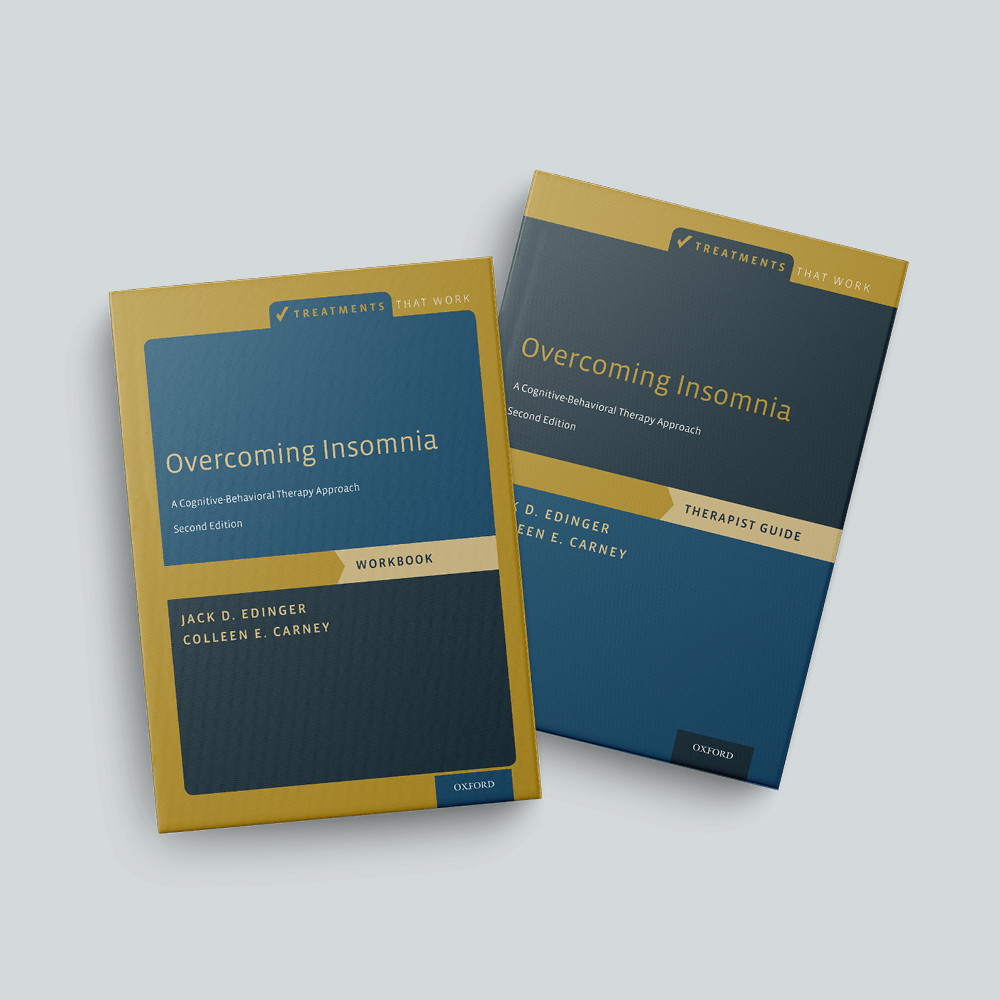Overcoming Insomnia (Second Edition): Therapist Guide
Overcoming Insomnia comes in two volumes. This page is for the Therapist Guide. Click on the following link to access the Client Workbook.
It is estimated that one in ten adults in the USA suffers from chronic insomnia. Unlike pharmacological approaches, cognitive behavior therapy (CBT) insomnia treatments have been shown to yield long term improvements. Overcoming Insomnia is written by Jack Edinger and Colleen Carney, and provides therapists with all the tools they need to deliver effective, evidence-based psychological treatment for insomnia. Part of the Treatments That Work™ series, it provides step-by-step instructions for teaching clients skills to overcome their insomnia.
Download or send
Tags
Languages this resource is available in
Problems this resource might be used to address
Techniques associated with this resource
Mechanisms associated with this resource
Introduction & Theoretical Background
Insomnia is a common sleep disorder, characterized by difficulties initiating, sustaining, or obtaining satisfying sleep. About one in three adults experiences intermittent insomnia, and between 10-22% suffer from chronic insomnia. Overcoming Insomnia is a comprehensive program to assist clinicians in delivering effective CBT for insomnia. The program includes two books:
- Overcoming Insomnia: Therapist Guide details the step-by-step cognitive behavioral treatment of insomnia. Learn how to give your patients information about healthy sleep, and then implement a behavioral program to address your patient’s specific sleep problems.
- Overcoming Insomnia: Workbook is the companion to this therapist guide. It will help your patients to become active participants in their treatment, learn about healthy sleep, and develop an effective sleep regimen to improve their sleep.
About Treatments That Work™
Authored by leading psychologists including David Barlow, Michelle Craske and Edna Foa, Treatments That Work™ is a series of manuals and workbooks
Therapist Guidance
Each Treatments That Work® title is published in two volumes:
- Clients use the Workbooks which contain elements of psychoeducation, skills development, self-assessment quizzes, homework exercises, and record forms.
- Therapists use the Therapist Guides which contain step-by-step instructions for teaching clients skills, overcoming common difficulties.
Therapists with an active subscription to a Psychology Tools ‘Complete’ plan are licensed to use Treatments That Work® titles, and to download and share chapters with their clients.
References And Further Reading
- Currie, S. R., K. G. Wilson, A. J. Pontefract, and L. deLaplante (2000). “Cognitive-behavioral treatment of insomnia secondary to chronic pain.” Journal of Consulting and Clinical Psychology, 68(3), 407–416.
- Edinger, J. D., W. K. Wohlgemuth, A. D. Krystal, and J. R. Rice (2005). “Behavioral insomnia therapy for fibromyalgia patients: A randomized clinical trial.” Archives of Internal Medicine, 165(21), 2527–2535.
- Edinger, J. D., W. K. Wohlgemuth, R. A. Radtke, C. J. Coffman, and C. E. Carney (2007). “Dose-response effects of cognitive-behavioral insomnia therapy: A randomized clinical trial.” Sleep, 30(2), 203–212.
- Edinger, J. D., W. K. Wohlgemuth, R. A. Radtke, G. R. Marsh, and R. E. Quillian (2001). “Cognitive behavioral therapy for treatment of chronic primary insomnia: A randomized controlled trial.” JAMA, 285(14), 1856–1864.
- Greeff, A. P., and W. S. Conradie (1998). “Use of progressive relax- ation training for chronic alcoholics with insomnia.” Psychological Reports 82(2), 407–412.
- Manber, R., J. D.





